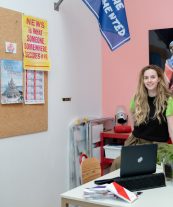COMMON GROUNDS: Manon van Hoeckel x Femke Hoppenbrouwer


— ‘Not knowing is the golden ticket for the design process’
Social designer Manon van Hoeckel, who won a Dutch Design Award in the Young Designer category in 2018, highlights the work of Femke Hoppenbrouwer, who recently completed a master’s in Social Design at the Design Academy Eindhoven with her project The Mobility Scooter Dance Collective. Both designers focus on making complex social issues accessible, and while they hadn’t met personally before, it quickly becomes apparent that their paths have crossed in their work.
Femke: “While working on my bachelor’s, I came across the term ‘Social Design’ through Manon’s work—it was essentially my starting point. I used to talk about her a lot back then.”
Manon: “And now, here we are, as colleagues! What I admire about Femke is how she tackles social issues in an accessible way, creating an enjoyable and light-hearted experience for participants and observers alike. You get drawn in playfully, encouraging you to think more deeply about the subject.”
Femke: “A project usually starts with a detail that piques my curiosity. Things you wouldn’t normally notice are what attract me. When you start thinking about such things, you quickly uncover broader social issues underlying them. I kept seeing someone in my neighbourhood on an extravagant mobility scooter and thought: there’s more to this.”
Manon: “You could spend a year writing a plan, but Femke just went out, approached someone on the street and started riding a mobility scooter herself. To me, that’s the most obvious way of conducting research. I see that as a positive, yet not many people work that way.”
Working Method
Femke: “I wanted to remove the dull stigma from the mobility scooter by taking it out of its usual context. We associate scooters with healthcare and their practical function as mobility aid. I then looked for a contrast, and the opposite of that, for me, was theatre. That’s how the idea for a dance performance came about.”
Manon: “I use a kind of Trojan horse method myself. I have a particular goal, like getting people into a museum who wouldn’t normally go there. I do this by first joining the new target audience and seeing what already fits into their lives.”
Femke: “And by involving the non-design world, you can ensure the authenticity of a project.”
Curiosity
Manon: “My issue is that I find almost everything interesting—I’m inquisitive. As a student, I thought I needed to know everything. Now, I see my lack of knowledge as a strength. I let myself be inspired by the experiences of others, and it’s important not to have a strong opinion of yourself. That only creates noise in the research process.”
Femke: “I also try to maintain a blank slate. A potential statement should emerge from the research; it can’t be there at the start. Things can always turn out differently than you expected.”
Manon: “Yes, not knowing is the golden ticket.”
Catalyst
Femke: “What we both do is stir things up a bit so that people start looking at things differently. In the future, I hope to bring my concepts to multiple locations because interaction is what leads to social impact.”
Manon: “When I first graduated, I thought I needed to complete at least two projects a year under my name, but I’ve let go of that completely. I’m now more focused on where I can make a real difference—I don’t care if my name is attached. That’s why I increasingly take on commissioned projects, where there’s urgency and a team committed to making it happen. As a designer, I think you’re more of a catalyst than the solver of major social problems.”
Mirror
Femke: “The research needs to be shared because otherwise, it’s just a nice personal experience. The way creative people think can shine a different light on things, making what doesn’t yet exist imaginable. And sometimes, all you create is awareness.”
Manon: “I was recently at a youth care organisation, and after an hour, I said, ‘With all these jargon terms, I don’t understand anything you’re saying.’ It holds up a mirror to people because if I don’t get it, how must it be for their young clients? You know, everything related to social values in our society has been made very complex. There’s a role for designers to simplify that.”
Evelien Reich has been the chair of the Young Designer jury of Dutch Design Awards for the past three years. This year, she interviews the Young Designers DDA has selected from the archives and the talents those designers choose to spotlight. All twenty Young Designers from the past and the present will be showcasing their work in the 2024 DDA exhibition during Dutch Design Week in Eindhoven (19–27 October).
Discover the work of Manon van Hoeckel and Femke Hoppenbrouwer and all the other Young Designers of the Past & Present in the DDA24 exhibition at Microlab Hall on Strijp-S, during Dutch Design Week. From 19 to 27 October 2024 in Eindhoven.